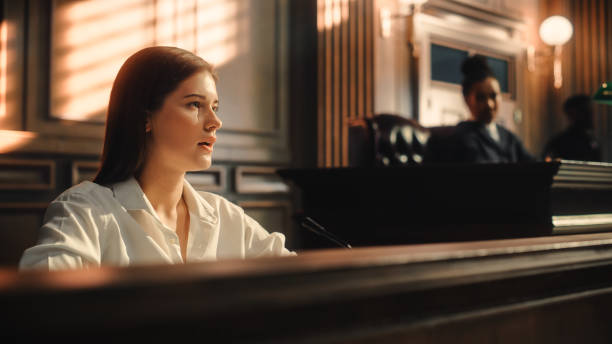Section 102C Family Law Act discusses testimonies in a court proceeding. A testimony is written evidence or a statement made under oath in response to lawyers or authorised public officials. Testifying is another term for giving testimony or evidence. Courts may allow testimonies through the use of:
- Video links
- Audio links; or
- Any other appropriate way of showing evidence.
Section 102C Family Law Act states that testifying people can’t give testimonies if they are in a foreign country. They also can’t give testimonies if the country they’re residing in doesn’t allow them to do so.
Furthermore, some countries might see that it’s convenient for the testifying person to give testimony on oath. This article will discuss Section 102C Family Law Act 1975 and how testimonies work in Australia.
Section 102C Family Law Act: How Does Witnessing Work?
Witnesses are individuals who have knowledge that can help during a court case. The Federal Court of Australia may invite a person to testify as a witness about an incident relevant to a case. Expert witnesses are people who testify in a court proceeding due to their specialised knowledge of the Evidence Act 1995.
Typically, lawyers will get in touch with witnesses and let them know when they are called over to the court. The summoning attorney will speak with the witness if they don’t have a lawyer. Witnesses who won’t be able to attend due to other commitments should inform the summoning lawyer.
For instance, if witnesses get sick or have an important appointment on the day they’re meant to appear in court. Witnesses may also inform a summoning lawyer if they need a lawyer themselves. Witnesses may also inform a summoning lawyer if they need a lawyer themselves.
However, witnesses who refuse to come to court may receive a subpoena. Subpoenas are court orders that demand a person to appear in court along with a specific place, date, and time. Further refusal will ultimately result in the arrest of the witness.
FAMILY LAW ACT 1975 – SECT 102C
Testimony
(1) The court or a Judge may, for the purposes of any proceedings, direct or allow testimony to be given by video link, audio link or other appropriate means
(2) The testimony must be given on oath or affirmation unless:
(a) the person giving the testimony is in a foreign country; and
(b) either:
(i) the law in force in that country does not permit the person to give testimony on oath or affirmation for the purposes of the proceedings; or
(ii) the law in force in that country would make it inconvenient for the person to give testimony on oath or affirmation for the purposes of the proceedings; and
(c) the court or a Judge is satisfied that it is appropriate for the testimony to be given otherwise than on oath or affirmation.
(3) If the testimony is given otherwise than on oath or affirmation, the court or a Judge must give the testimony such weight as the court or the Judge thinks fit in the circumstances.
(4) The power conferred on the court or a Judge by subsection (1) may be exercised:
(a) on the application of a party to the proceedings concerned; or
(b) on the court’s own initiative or on the Judge’s own initiative, as the case may be.
(5) This section applies whether the person giving testimony is in or outside Australia, but does not allow testimony to be given by a person who is in New Zealand.
Preparing for the Hearing
It’s normal for witnesses to feel anxious when they are requested to come to a court hearing. After all, legal procedures will pose a lot of heavy penalties for a losing party. Hence, it’s important for witnesses to speak with a family lawyer to assist them in the court hearing. In order to minimise further complications in court proceedings, witnesses should:
- Simply tell the truth
- Speak clearly and slowly
- Respond to the judge if he/she asks a question
- Give the judge the title “Your Honour”
- Wait for a question to finish before answering
- Refrain from making gestures when responding (nodding, shrugging, pointing, etc.)
- Answer questions directed at them
- Clarify a question if they don’t understand it
- State facts with their opinion only when asked to do so
- Switch off mobile phones to avoid distraction
- Not chew gum, eat, or drink beverages while giving a testimony
- Refrain from using obscene language
- Not write anything down unless given permission to do so
- Avoid leaving the courtroom unless given permission to do so
- Not discuss evidence with other people during breaks
Witnesses who provide enough evidence in court may be given permission to leave the building. Having JB Solicitors during these times is important since they can guide you on what to do. They may also give you legal advice on how to easily present your facts and lessen the tension. Surely, witnesses would want to walk away from the building with confidence in their testimonies.
Contact a family lawyer today for your testimony matters.
